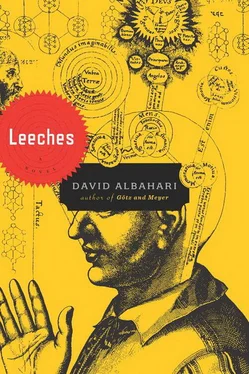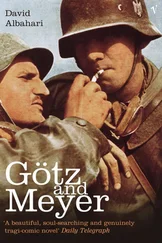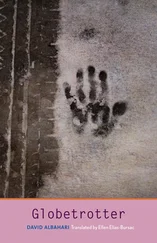as if she hadn't seen me, maybe she genuinely didn't see me, maybe back there in that corner I was invisible, hidden who knows how from the rest of the world? You're crazy, said Marko, though I understand the urge to become the invisible man. Better the invisible man than Batman, I replied, and slipped out the door to avoid Marko's tirade about comic book characters and their symbolic meaning. The chill darkness awaited me outside, or I would have gone straight to the courtyard at Zmaj Jovina. Early the next morning, it may have been before six, the phone rang, and continued to ring so insistently that I had to get up and stumble over to the side table in the living room, but when I finally lifted the receiver, there was no one there, and a few seconds later I heard the click of the connection being broken. I went back to bed but couldn't sleep. I tried to read; alas, that magical formula for falling asleep works only in the wee hours, not in the early morning. Actually, the book I had picked up to read, which described the system of German concentration camps during World War II, made me even more awake. I finally got up at seven with a grinding headache, dressed, put water on for coffee, went down to buy my paper. Hardly anyone bought the newspapers anymore because the news they carried and the accompanying commentary were so predictable, but the morning reading of the paper with a cup of black coffee was a ritual I could not relinquish. It was better than watching television, which never ceased to be a source of official propaganda, a parade of bizarre creatures often of stunted intellectual capacity. The newspapers were different: you could always skip the first pages and focus on the sections about life in the city, practical advice, and sports; on the other hand, even in the first section, there was the chance that a journalist might slip in a subversive twist, a tiny signal that reality was not what the government claimed it to be, and the search for those twists provided an appealing intellectual game, as long, of course, as the reader didn't have a headache. So I gave myself over to the pages with the obituaries, neutral enough for the pain assaulting my forehead and temples. Death, judging by the obits, was busy those days, as usual discriminating in no way among gender, age, or place of residence. The faces, old and young, male and female, even children, looked me straight in the eyes, as if it were my fault that they were there, offered briefly to a world that had never cared about them. I sipped my coffee and turned to the section with the personals and classifieds. The small number of readers meant a small number of ads, and under the heading Miscellaneous there were only two. The first offered a universal product for the cleaning and repair of scratched autobodies, which, it said, was not the only way this product could be used. The second ad read: Sometimes a slap can change the entire cosmos — Code Palm. I stared at the words, unable to believe my eyes, though I was certain they were written for me alone. Again I saw the woman stagger and the man say something savage, which, I sensed, had startled her. Something had been set in advance, had not gone according to plan, and at that moment the cosmos had begun to collapse for all of us, to shed the skin containing it. One question, however, still begged to be answered: Why was all this being played out before me? What could I possibly mean to the people who had devised the game? I was not caught up in any political shenanigans, I had no friends in high places in the government or cultural institutions, I had no ties to international humanitarian organizations, at times I didn't even know my own name. Perhaps this was all a mistake, it suddenly hit me, as I was still poring over the ads page, maybe they had confused me with someone else, an important writer or professor, someone they needed to communicate with or draw into a tangled game from which, in fact, it would be best to flee, and fast. I poured more coffee, sipped the cold liquid, and sat back in the chair. Even if it's a mistake, to whom should I report it? If I don't know who made the mistake, how can I tell that person to stop bothering me? I looked at the ad. My headache had meanwhile receded, leaving only a small knot on the right temple. I pressed my index finger to it, and the dull throb made me suck in my breath. Then I stood up and went over to the computer to write a message using the code word
Palm. After thinking about it at length and after several dozen trial sentences, I wrote, I know what a slap that can destroy the entire cosmos looks like. I was there, and I heard the sound that the cosmos releases as it dies. I haven't told anyone, I lied, because some things must never be said out loud, but now I am convinced the time has come for the cosmos to be renewed. I gave my phone number, tucked the message into an envelope, and sealed it. My message, I had to admit, sounded ridiculously naive and immature, but that, I consoled myself, was how the ad had sounded too. It wouldn't surprise me, I thought, if in the end aging hippies, equipped with sticks of incense, showed up with stories about good vibes and disturbances to the equilibrium of the world. The slap from the ad suddenly sounded like the question about one hand clapping, one of those essential Zen questions that had a huge influence on the hippy movement. I lifted my hand and stared at the palm. Marko laughed when he heard my story. I stopped in to see him after I had dropped the envelope off at the
Politika personal ad department. If he understood correctly what was going on, Marko said, I was obviously slowly sinking into madness. Either that woman, he continued, scrambled your brain, or you scrambled your own brain and are making up stories, which, no matter what happened, treat everything as if it were part of a big plot. Either everything is interconnected with everything else, I replied, or nothing is interconnected with anything; there's no third way, but if I had to choose I would choose the former, because even if it were plausible no one could keep the latter going, and faced with that level of chaos, I said, we would collapse. You just might think about not smoking, Marko said, and passed me the joint. Drunks see white mice, and people who get hooked on cannabis see conspiracies. Sometimes you talk too much, I said. Marko closed his eyes and stretched out on the couch. That's because, he said, I haven't found anyone to be silent with. Not long after I heard his deep breathing, I found a blanket, covered him, switched off the light, and left the apartment, pulling the door shut behind me. It was raining outside and I made my way slowly through the pedestrians with umbrellas, so it was much later — I'd nearly made it home — when I realized that as I'd left Marko's building I passed a man in a black trench coat. When I spun around there was no one behind me. If he was following me, the man in the black trench coat was exceptionally clever. I stood a while longer at the entranceway, surveyed the street, but saw no one wearing a black trench coat or taking an interest in me. The damp crept under my clothes, invaded my body, and robbed me of my warmth, but I waited patiently until my teeth were chattering. The next days I didn't venture out. The damp and cold did their work, and I had to surrender to aspirin and hot tea. Colds usually put me in a vile mood, but this time I was glad to stay home, because that way I could be sure not to miss the call of the person who had placed the ad in
Politika. Three days later, with the cold letting up, I began to doubt the call would ever come, so I was all the more surprised when on Tuesday, I think it was, a man's voice at the other end of the line said he was calling in response to my response to the ad. He was curious, he said, about where I had heard the sound of the cosmos dying. On the riverbank, I said, where else could I have been? And the sound, he asked, what was the sound like? Unique, I answered. I understand, said the voice, which had suddenly gone still; then he asked whether I was sure I'd told no one. No one, I lied again. Not even your parents? the voice insisted. My parents are dead, I said. The voice went still again, then apologized in case he had upset me, adding that then I indeed did know how the cosmos dies. But now the moment has come for it to be reborn, I said, hasn't it? The voice asked how I would do that. I'd be gentle, I said, and I would never raise my voice. Good, said the voice. For a moment I thought he would not speak again. Might you, the voice inquired, go to the same place this evening? Sure, I said. At eight, said the voice, and hung up. I held the receiver to my ear a little longer, as if the pulsing of the telephone signal could explain something. Beyond the signal, somewhere very far away, I could hear inarticulate fragments of a conversation, and then they too faded. I put down the receiver and looked at the clock. I had more than two hours until the meeting, if we were thinking of the same place, that is: the quay next to the playground. I didn't want to believe that this might be a misunderstanding, a different slap altogether and a second, or a third, cosmos, so when the time came to leave, I grabbed my jacket and headed for the quay. The promenade at that time of day was full of people, despite the black clouds careening through the dark sky, which made it all the more difficult for me to keep an eye out for the person I was supposed to be meeting. The man I had spoken to on the phone sounded like someone who was getting on in years, though that impression might have been wrong, he could have been a young man with his voice altered by an old or damaged phone. Of course I might sound, and probably did sound, entirely different over the phone, and so the feeling of mutual betrayal was only to be expected. For that reason, and perhaps out of insecurity, I decided to go around the high-rise and approach on a transversal the shabby merry-go-round, from which came the sound of children shrieking, through a dark parking lot and between rows of cars. Along the bank, among the trees, as well as near the apartment buildings, especially by the high-rises, there were oases of dark shadows in which it would be possible to hide, though I could not imagine why someone who wanted to meet me would want to hide. I got closer to the playground, stepped onto the path, and turned right, toward the bench on which I'd sat then, and the bench, like all the rest, was taken, so I decided to stand right there, staring at the river and the glow of Belgrade, and wait. Fifteen minutes later I told myself I was crazy, and still I didn't budge. Meanwhile a group of teenagers got up from one of the benches, shouting and swearing, leaving a semicircle of spit on the pavement. I waited for them to move off, then walked over, wiped the bench with a tissue, and sat down heavily, as if I had been walking for days. I threw back my head and looked up at the sky. Straight above, between the clouds, I saw two stars. A moment later, a cloud moved and I saw a third star, and then, right behind my head, I heard a voice asking if the seat next to me was free. When I looked to the side, I saw an old gray-haired man, slightly stooped. He was holding a large envelope. He looked at me, cleared his throat, put the envelope down on the very edge of the bench, rested his head on his hand, and fell asleep. Marko didn't believe me, I saw it in the way he shook his head. I didn't dare move, I said, and I wasn't even breathing, just as I probably hadn't blinked, convinced that even the softest sound or the least jostle would wake him, which I sensed would have had catastrophic consequences, like the beginning of a new ice age or the ripping of the universe like a tattered handkerchief. Then I heard a voice by my left ear instructing me, gently, ever so gently, to take the envelope because it was time for me to go. I turned: no one was there. The voice went on whispering in my ear, though I could no longer distinguish the words. My head drooped, my eyelids shut, and when I opened them again, I was amid the stalls at the marketplace, in the darkest night. I was holding the envelope, which contained pages of a manuscript. When I tell Marko about all this, I thought, he will demolish me. And indeed, when I'd finished the story, Marko nearly fell off his chair. All that masquerade, he laughed, just to hand you a manuscript, hey, they could have delivered it to you at home, man, why waste your time on the quay, do these people know what century they live in? I'd wondered that myself, but I didn't say anything. I waited for Marko to leave. There was a limit to how much I could take of his commentary, and I was not prepared to push the limit that evening. For the same reason I neglected to tell him that as I placed the manuscript on the table when I first got home, I saw on the envelope the faint impression of that same geometric figure, but later it was gone. For me this might have been magic; for him it would have been one more chance to ridicule such thinking and to talk about the chemical reactions that could make a text visible or invisible, on request. I could not allow him to get to me. I had had disappointment enough when I had arrived home, cautiously opened the envelope, and pulled out the thick bundle of pages printed on someone's laser printer. I don't know what I'd been expecting, exactly, perhaps a mysterious inscription or a copy of a precious document, but I certainly had not imagined a computer printout. I leafed through it quickly, then slid it back into the envelope and dropped it into a drawer in my desk, where it stayed until Marko came over to hear what had happened to me. It was not until after he had left that I could finally give the manuscript my undivided attention; it looked different to me, it even felt heavier. On the first page there were only two words,
Читать дальше







![David Jagusson - Fesselspiele mit Meister David [Hardcore BDSM]](/books/486693/david-jagusson-fesselspiele-mit-meister-david-har-thumb.webp)




